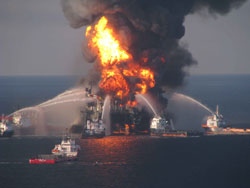| Home | Blog | Ask This | Showcase | Commentary | Comments | About Us | Contributors | Contact Us |

Questions for BP and the oil industry, one year after Deepwater HorizonASK THIS | April 105, 2011Antonia Juhasz raises key questions that remain unanswered about the spill. The one-year-anniversary on April 20 presents an opportunity to ask them. Juhasz, author of the new book, Black Tide: the Devastating Impact of the Gulf Oil Disaster and director of the Energy Program at Global Exchange, confronted BP executives at their annual shareholders meeting in London on Thursday, speaking on behalf of Gulf residents who were not allowed to speak. “I demanded an immediate response to BP's denying the voice of those that had traveled from the Gulf to tell the truth about what has really been happening to their health, livelihoods and home,” Juhasz said after the meeting. “I also demanded a response to the failure of the corporation to provide for the safety of its deep water operations and read a statement that Keith Jones, whose son, Gordon Jones, was killed when the Deepwater Horizon exploded, gave to me and asked me to read.” By Antonia Juhasz Questions For BP: Q. Why are you afraid of the people of the Gulf Coast? On April 14, 2011, BP held its annual general meeting in London. Five community leaders from the Gulf Coast, including Byron Encalade, shrimper, a leader of African-American and minority oyster fishermen and president of the Louisiana Oystermen Association, and Tracy Kuhns, fisherwoman and director of Louisiana Bayoukeeper, held proxies to attend the meeting. All five were denied entrance by BP and instead forced to wait out in the lobby. I had been with the Gulf Coast leaders (all of whom appear in my book) for days in London conducting extensive press interviews and public events in which they detailed how the oysters and shrimp have not returned to Louisiana, how claims had not be paid or processed, and how their communities remain out of work, out of money, sick from exposure to oil and dispersants, and desperately afraid of what their future holds if it does not hold the sea life on which they have depended for generations. Why was this message denied to the shareholders, board members, and other executives of BP? Q. Is BP now prepared to address a deepwater blowout? In February 2009, BP submitted its Initial Exploration Plan for the Macondo well to the Interior Department’s Mineral Management Service (MMS). In it, BP certified that it knew that the worst-case-scenario of what could occur in the Gulf was a deepwater blowout. Yet when the Macondo oil well blew out, we all learned a terrible secret: neither BP, nor any other major oil company in the world, knew how to address a deepwater blowout. Rather, they “learned on the fly” for three long months, applying shallow-water technology to a deepwater well. A cap was finally successful in sealing the well. However, the well was only considered safe when the relief well was finally completed --- five long months later. Therefore: Q. Is there any reason to believe that the cap applied to the Macondo oil well was sufficient? Q. Is there any reason to believe its technology is fully applicable to other deepwater wells in the Gulf? Elsewhere in the world? Q. If the relief well is the only satisfactory final answer to a deepwater blowout, is there any reason to believe that it will not take five months again to stop the next deepwater blowout, as it is impossible to drill faster? Q. Is BP now prepared to address a fire on a deepwater rig? When the explosions took place on the Deepwater Horizon, they caused a massive fire. After the surviving crewmembers escaped the rig, the firefighting efforts began. However, what became immediately and painfully obvious was that there was no firefighting plan in place to address a fire on a deepwater rig in Gulf of Mexico -- not by BP, Transocean, the federal government, nor anyone else for that matter. During the 36 hours of firefighting that took place, there was no one in charge, no plan, and clearly no preparation. There was no team of Transocean or BP offshore firefighting vessels or personnel trained, ready, and deployed from some other location. There was no adequate, informed, or trained firefighting response. Instead, the activities of the four to six Good Samaritans who sprayed salt water on the fire could actually have unintentionally caused the rig to capsize, sink, and release the oil gusher. Q. Is BP now prepared to address an oil spill of 300,000 barrels a day, as it indicated it could in its Initial Exploration Plan for the Macondo well? In its February 2009 exploration plan, BP certified that it had the ability to handle an oil spill in the Gulf of 300,000 barrels of oil per day -- its worst-case scenario for any of its Gulf operations. At its worst, the Macondo oil blowout released an estimated 80,000 barrels of oil a day. However, BP was caught utterly unprepared and without necessary equipment to address the blowout, ships to capture oil, boom to hold it and protect the coasts, nor skimmers to suck oil up. Instead, the oil was released into the Gulf, where it remains today. Was BP misleading the federal government in order to get approval for its operations? Is it now actually prepared for another such blowout? Does it have the ships? Equipment? Boom? Skimmers ready and at hand? Does it have all the above now ready to deploy at all of its deepwater operations around the world in order to address a 300,000 barrel a day spill? If not, why should BP be allowed to continue operating? Q. What does BP think that it owes for the oil spilled in the Gulf? Why has BP asked a judge to consider a day-rate fee for the oil spill in the Gulf, rather than a per-barrel-fee as dictated by the Clean Water and Oil Pollution acts? The former would require a fee of less than $3 million, the latter, as much as $20 billion. How much oil does BP believe was spilled in the Gulf? Do you agree with the standard accepted amount released, as defined by the National Commission on the Deepwater Horizon disaster, of 5 million barrels of oil released? If not, how do you explain your number (regularly reported as being half as large) and how it differs so greatly from those of other experts in the field? Does BP believe that a $3 million fine would deter subcontractors such as Transocean and Halliburton -- which BP has been quick to blame (appropriately so) for their role in the disaster -- from taking unsafe actions in their deepwater operations? Q. BP still owns the rights to the Macondo oil well. Does it plan to drill at that well again, just in a different site? Q. Is there oil still leaking from the Macondo oil well as recent studies have found (my sources are not public). Q. BP’s management has been severely criticized by the Deepwater Horizon Study Group, the National Oil Spill Commission and others. What specific changes in management and oversight has BP made since the disaster? Questions for the rest of the oil industry Q. Ask Exxon, Chevron, Shell, ConocoPhillips, and every other major deepwater operator the questions listed above related to deepwater blowouts. None of them knew how to address a deepwater blowout, were prepared for the fire, nor were prepared for the spill. Are they all now prepared for a deepwater blowout? Are they now able to handle a 300,000 barrel a day blowout? If not, why should they be allowed to renew operations in the Gulf of Mexico or elsewhere in the world? Q. Why have they all failed to invest any meaningful funds into oil spill technology, as concluded by the Presidential commission? Why are we still using the same utterly failed technology, which has been in use for decades? If they do not have better oil spill technology than what was used in the Macondo blowout (which included the application of nearly two million gallon of toxic chemical dispersants, the effect of which on seafood, human health, and the ecology, especially when mixed with oil, is untested and unknown) then why should they be allowed to renew operations in the Gulf of Mexico and elsewhere? Q. Is Transocean safe? All of the world’s major deepwater producers work with Transocean, the largest owner and operator of offshore rigs in the world. However, investigations into the Deepwater Horizon disaster have found shocking, extreme, and potentially criminal operational failures by Transocean. In fact, between 2008 and up to but not including the explosion of Deepwater Horizon, 73% of incidents that triggered federal investigations into safety and other problems on deepwater drilling rigs in the Gulf had been on rigs operated by Transocean, according to the Wall Street Journal. Q. Why do you have confidence that Transocean is now operating fundamentally differently than it has in the past, particularly given the fact that it has argued in a proxy statement that 2010 was “the best year in safety performance in our company’s history,” and then awarded its executives, including the CEO, both bonuses and raises? If you are not confident, why should Transocean be allowed to continue operations offshore? Without Transocean, can you continue your operations? Finally, much of the American public seem to believe that “oil drilled here, stays here.” But, federal Energy Information Administration statistics show that oil and gasoline are increasingly being exported out of the United States. Q. How much oil and gasoline do you export out of the U.S. each year? Is that amount increasing? How much is from the Gulf of Mexico? Do you anticipate increasing more over the coming years?
|
|




